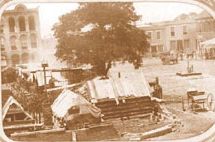Murfressboro, Tennesee, safely in Union hands, has become a magnet for escaped slaves, Confederate deserters and poor white families displaced from their rural homes. In ever greater numbers, the refugees set up camp in and around the city.
Many of the poor white refugees take up residence in the yard of the city’s Baptist church, as John C. Spence, a local businessman, notes with disdain in his diary today.
There is a large number of [white] country people, from different sections, that has congregated here. That is commonly called refugees, who, as a class of people, are generally a degree below the negro, but, like the negro, make their appearance. Man and woman, half clad, with a half doz tow head children, all with small bundles under their arms of old quilts and a fiew articles of clothing. Another set-a man carrying a bundle, which appears to be about the house hold for himself, wife, and three or four tow heads and a dog or two. His elbows and knees out, a seedy hat, and an apology for shoes, wife half clothed and look like she had not been near water for a month or more. Children frequently bare-footed, hair resembling porcupine quills.
These motly crouds make their appearance, tell a pitiful tale, say that everything they had was taken from them. It is plainly seen, they had nothing to take. They, like the negro, came here to be fed and do nothing, as usual.
These people claim. . . to call themselves Union, came for protection. Some of them thought the “sesesh” ought to be turned out of their house and let them have places to live. These people lay, or camped, in the Baptist church, men, women, and children.
Their friends, the Yankees, did not have much confidence in them. They allowed the men to carry their wood on their shoulders for half a mile without offering to haul [it for them]. [They] Had to cook out in the street. Many of these men were put on the fortifications to work for rations. This may set a hard picture to look [at]. It is the truth.
There was a little better looking class of Union, who run off from the rebel lines, left their families at home to take care of themselves as best they may. They did not wish to be conscripted [into the Army of Tennessee], [and] thought this to be a more safe place. But the Yankees, always a calculating people, thought there was too many good soldiers out of the army, so they set about and formed a regiment, as far as it would go, out of this stock. No doubt but there was many a disappointed fellow “Out of the frying pan into the fire.”
Spence
Sources: John C. Spence Diary, March 1, 1863, cited in Tennessee Civil War Sourcebook (link); A Diary of the Civil War, by John C. Spence; Rutherford County Historical Society, Murfreesboro, Tennessee, 1993; image (link)



